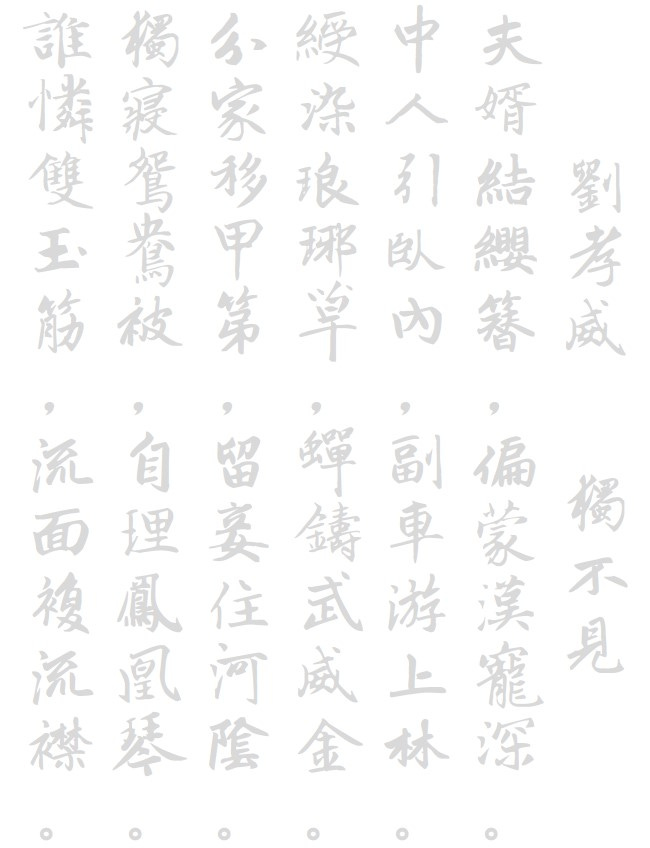Out of Sight
Liu Xiaowei
.
He knots his chinstrap hey-oh-hey,
He pins his hair oh-hey.
The emperor loves my husband hey,
Honours him every way.
The eunuchs lead him hey-oh-hey
Through bedrooms after dark.
The royal carriage day-by-day
Takes two to hunt the park.
His seal is tied with silk that's dyed
The green of Langya grass,
His golden Wuwei beetle shows
The highest martial class.
Our house divided hey-oh-hey,
He lives in a great estate.
While back in Heyin hey-oh-hey,
I live without a mate.
Faithful pairs of ducks are sewn
On my bed clothes hey-oh-hey.
The phoenix harp I pluck alone
Was made for two to play.
Who sees these drops of jade, oh-hey?
Who sees my loneliness?
They wet my face each day, each day,
They fall and wet my dress.
Out of Sight was a title used by many poets, all writing on the theme of a woman missing her husband who has been away for many years. This may be because he loves another, or is away at war, or has gone to work for the emperor. Only one poem with this title was judged good enough to be included in the 300 Tang Poems, but the Complete Tang Poems includes nine with this title, and they form a fascinating series, dating back to the 6th century, before the beginning of the Tang.
Often, the title of a poem gave name of the tune to which it should be sung. However, that doesn't seem to be the case for Out of Sight: some of the poems are very short, while others are medium length; some use short lines, others long. Instead, the poems are linked by two themes: the loneliness of a woman whose husband is away, and rich lifestyles. Both themes are brought out most clearly by Shen Quanqi in the single Out of Sight poem collected in the 300 Tang Poems.
Liu Xiaowei's date of birth is unknown, but he died in 548.
This early Out of Sight poem varies the pattern of a woman mourning her husband gone to war: this husband abandons his wife for the good life in the capital. The contrast between rich lifestyle and sadness of being alone is starker because it the husband who enjoys the honours, while the wife is left at home.
The emperor at the time of writing was Emperor Wu of Liang, who does not seem to have had same-sex relationships. However, the poem is set back in the Han Dynasty, and some of the Han emperors certainly did, so the suggestive detail of the eunuchs leading the husband into the bedroom may refer to a sexual relationship.
During the Han Dynasty, the colour of the silk strap that held your official seal was a mark of civil rank; green represented one of the highest ranks. Langya is a place name; it's not known if Langya grass is any special colour.
"Beetles" were military insignia (probably just a pin rather than an actual insect shape). Here a golden beetle represented high military rank in the Wuwei theatre.
Heyin is in the west of modern Henan Province.
刘孝威 独不见
夫婿结缨簪,偏蒙汉宠深。
中人引卧内,副车游上林。
绶染琅琊草,蝉铸武威金。
分家移甲第,留妾住河阴。
独寝鸳鸯被,自理凤凰琴。
谁怜双玉筋,流面复流襟。




Nice work preserving the consistent rhyme in translation!